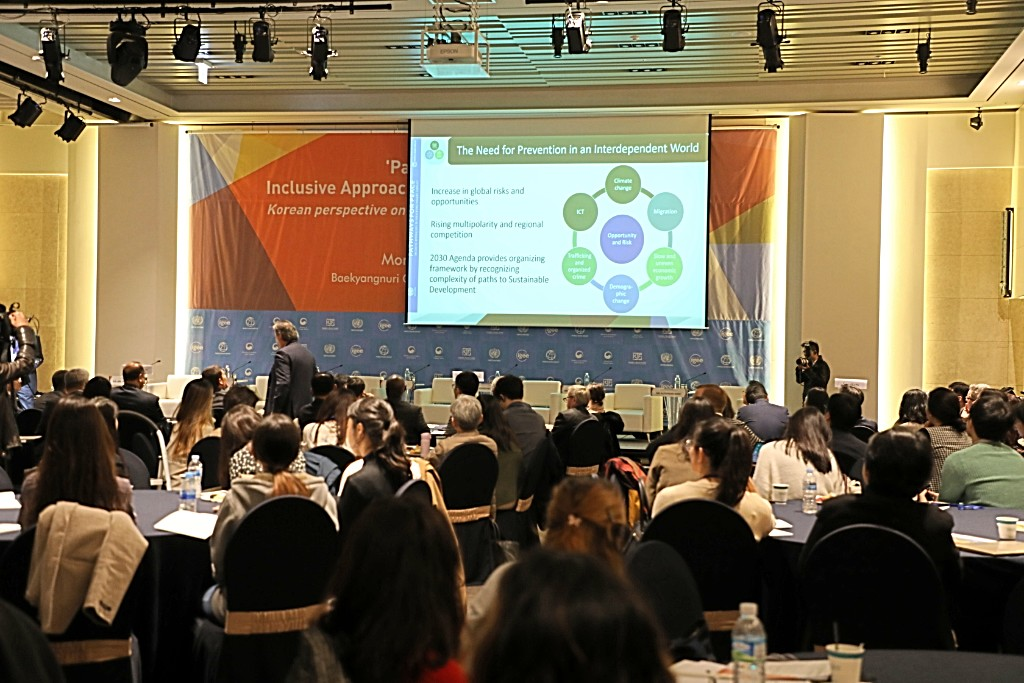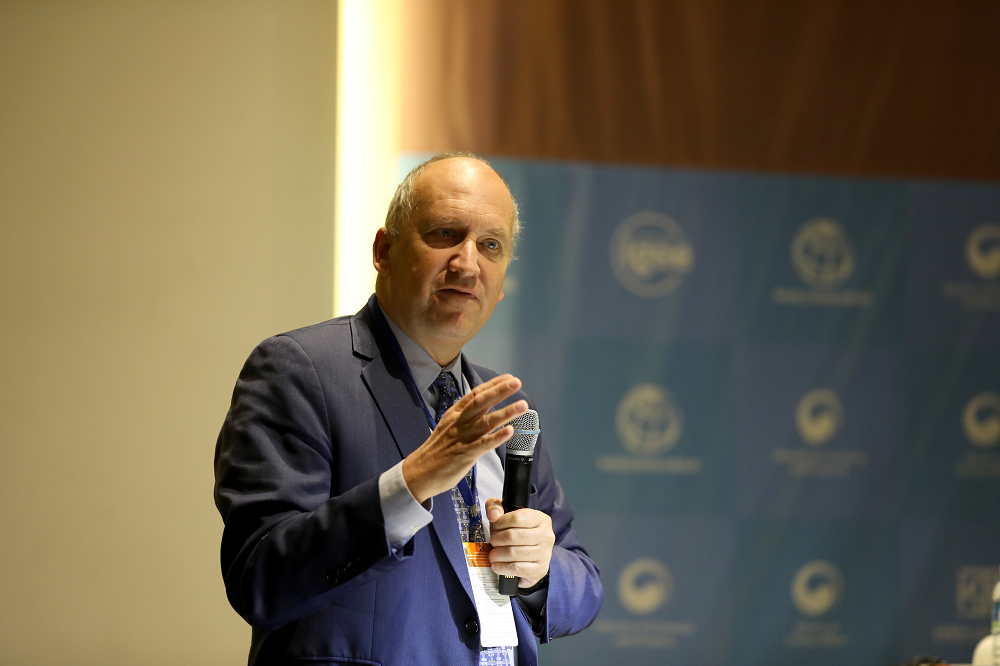- UN-World Bank Report Launched at Yonsei University in Seoul, South Korea November 06, 2018
-
Pathways for Peace – Moving Towards a Preventative Approach to Conflicts
In an unprecedented partnership, the United Nations and the World Bank have teamed up to co-author 'Pathways for Peace: Inclusive Approaches to Preventing Violent Conflict,' a first-of-its-kind report on peace and conflicts to address the resurgence of violence in recent years.
The Pathways for Peace report presents national and international actors an agenda for action to ensure that attention, efforts, and resources are focused on prevention, identifying significant policy lessons to drive future conflict operations and to help recognize opportunities for defense, diplomacy, and development to contribute to mutual success. With the report, representatives and affiliates of the partners are conducting presentations and conferences around the globe in accordance with the state of affairs in each region. Last October, it was South Korea’s turn and the event was held at Yonsei University in Seoul, South Korea.

On October 22, representatives of the United Nations and the World Bank met at Yonsei University to share their findings and offer a unique Korean perspective on the challenges and successes of development and conflict prevention to an audience of over 150 distinguished guests.
“We are living in a troubled world,” commented Shinki An, Director of the Ban Ki Moon Center for Sustainable Development of the Institute for Global Engagement & Empowerment at Yonsei University during his welcoming remarks.
 Shinki An, Director, Ban Ki Moon Center for Sustainable Development,
Shinki An, Director, Ban Ki Moon Center for Sustainable Development,
Institute for Global Engagement & Empowerment, Yonsei UniversityIn 2016, more countries experienced violent conflict than at any time in nearly 30 years and reported battle-related deaths increased tenfold from the post–Cold War low of 2005. Indeed, there has been a resurgence of violence conflict globally in recent years after decades of relative decline, with direct deaths in war, refugee numbers, military spending, and terrorist incidents reaching historic highs. In efforts to address this urgent issue, the joint report shared how defense, diplomacy, and development should work together to successfully prevent conflicts from turning violent.
Alexandre Marc, Lead-Author and Chief Specialist of the Fragility, Conflict and Violence Group at the World Bank, and Henk-Jan Brinkman, Chief of Policy, Planning and Application Branch of the United Nations Peacebuilding Support Office presented the key findings and recommendations of the report, followed by a national panel that discussed the Korean perspective.
Henk-Jan Brinkman of the United Nations Peacebuilding Support Office was the first the introduce the joint report, sharing that total funding requirements for humanitarian action in 2016 reached $22.1 billion USD - nearly a 70 percent increase from 2012. He highlighted how the current system, which responds to escalated conflicts rather than taking a preventive approach, has been costly globally – regarding human lives as well as economic losses - of up to $70 billion annually.
 Henk-Jan Brinkman, Chief of Policy, Planning and Application Branch of the United Nations Peacebuilding Support Office
Henk-Jan Brinkman, Chief of Policy, Planning and Application Branch of the United Nations Peacebuilding Support Office“We have clearly become less effective at ending violent conflicts,” said Brinkman. “We need to have a much broader approach.” He emphasized that the prevention of conflict must be a priority in order for the international community to achieve peace and sustainable development.
Alexandre Marc, Lead Author and Chief Specialist of the Fragility, Conflict and Violence Group at the World Bank shares similar sentiments. “It has to be a much more holistic approach,” he said. “We need inclusion.” He stressed the overall aim of the report, a result of the analysis of decades of accumulated data and academic papers, stating that findings confirm that investment in conflict prevention can save $16 per dollar.
 Alexandre Marc, Lead-Author and Chief Specialist of the Fragility, Conflict and Violence Group at the World Bank
Alexandre Marc, Lead-Author and Chief Specialist of the Fragility, Conflict and Violence Group at the World BankAfter the presentation, the two presenters were joined by a national panel* of government, academic, and NGO experts to deliberate together on the Korean perspective of the report. The panel discussed how to apply and implement the major findings and recommendations of the report in Asia and explored South Korea's role in establishing strong and comprehensive partnerships to prevent disputes at all levels.
Despite the fact that the Korean Peninsula is still in relatively tense relations, armed conflict in East Asia has actually not increased. South Korea itself has been praised for its dramatic transformation, from being an aid-receiving country to an aid-giving country in a short period. The country has been involved in peacekeeping activities of the United Nations since 1993 and has supported international peace-building as well as research and projects on conflict prevention through the Korea Trust Fund for Economic and Peace-Building Transitions since 2010.
 National Panel DiscussionThe general tone of the event implied that a comprehensive shift toward preventing violence and sustaining peace can offer life-saving rewards and thus the international community needs to band together to promote better policies and programs towards peace-building; governments need to address social inequality by using interactions in development, human rights, diplomacy, and security, and look at how best to prevent disputes by encouraging participation by officials in a wide range of areas.
National Panel DiscussionThe general tone of the event implied that a comprehensive shift toward preventing violence and sustaining peace can offer life-saving rewards and thus the international community needs to band together to promote better policies and programs towards peace-building; governments need to address social inequality by using interactions in development, human rights, diplomacy, and security, and look at how best to prevent disputes by encouraging participation by officials in a wide range of areas. Heon Joo Jung, Associate Professor of Public Administration, Yonsei University
Heon Joo Jung, Associate Professor of Public Administration, Yonsei University“There can be no sustainable development without peace and no peace without sustainable development,” remarked Jeong-sik Kang, Deputy Foreign Minister for Multilateral and Global Affairs, Ministry of Foreign Affairs of the Republic of Korea. “The world already has the resources to deliver the 2030 agenda. The only remaining question is how to connect the dots.”
 Jeong-sik Kang, Deputy Foreign Minister for Multilateral and Global Affairs,
Jeong-sik Kang, Deputy Foreign Minister for Multilateral and Global Affairs,
Ministry of Foreign Affairs of the Republic of Korea“Disputes are closely linked to other global issues such as organized crime, cyber terrorism, and climate change,” said Myongsei Soh, Chairman of the Institute for Global Engagement & Empowerment at Yonsei University. “The United Nations and World Bank's attempts to identify and resolve the cause of the conflict are very reasonable.”
The event was co-hosted by the United Nations, the World Bank, and Yonsei University's Institute for Global Engagement & Empowerment, and jointly sponsored by the Ministry of Economy and Finance, the Ministry of Foreign Affairs, and the Korea Trust Fund.
You can read or download the full study at www.pathwaysforpeace.org.
*National Panel Discussion participants
H.E. Jakob Hallgren, Ambassador of Sweden to the Republic of Korea (moderator)
Joonsung Park, Director General for Program Strategy and Policy Planning, Korea International Cooperation Agency
Heon Joo Jung, Associate Professor of Public Administration, Yonsei University
Heisoo Shin, Chair, Board of Directors, Korea Center for United Nations Human Rights Policy
Hyun Sook Lee, Honorary Representative, Women's Forum for Peace & Diplomacy
show mobile menu
mobile menu




